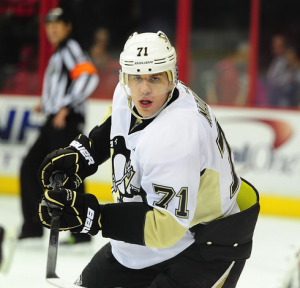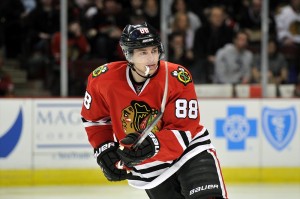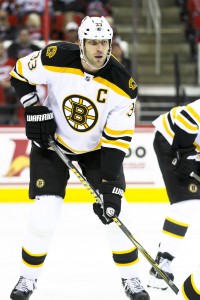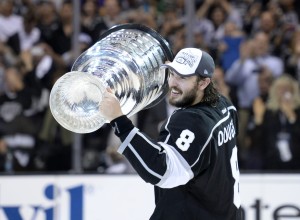In today’s salary cap NHL, it is becoming increasingly difficult to build a Stanley Cup contending team through trades and free agency. Big market teams can no longer out-muscle smaller markets in free agency by throwing the most money at a player without feeling cap repercussions. A trade deadline acquisition or big free agent signing could be the final piece that puts a team over the edge, but it cannot be the core. Ron Hextall, the new Flyers’ GM, sees drafting as the true route to success.
Hextall: "I dont believe you can build a team through trades and/or free agency. I do think you have to build from within."
— Broad Street Hockey (@BroadStHockey) August 7, 2014
With that theory in mind, you have two real options when building from within:
- Have an incredibly skilled scouting and development staff that converts late round picks and undrafted free agents into quality NHL players (see: Detroit Red Wings)
- Lose, and in the process acquire as many high draft picks and talented prospects as possible
Over the past six years, option #2 has become increasingly popular, and most importantly, successful in the NHL.
Tanking in the NHL Leads to Stanley Cups
Over the past six seasons, four different teams have hoisted the Stanley Cup: the Kings (twice), Blackhawks (twice), Bruins, and Penguins. For each of those teams, prior to their success, they had a period of multiple seasons when they were an awful NHL team. Let’s break them down one-by-one, starting with the Penguins:

The Penguins have been accused of tanking more than any other team in the league. It all started with the trade of Jaromir Jagr to the Washington Capitals before the 2001-02 NHL season. In 2000-01, the Penguins finished with 96 points and made a run to the Eastern Conference Finals. Then from 2002-03 to 2005-06, the Penguins had the fewest wins in the NHL, missing the playoffs each year.
During that time period, they amassed a treasure trove of talented young players that included two #1 overall picks, and two #2 overall picks. And had the Penguins won the 2004 Draft Lottery (they had the highest chance of winning), they likely would have ended up with Alexander Ovechkin instead of Evgeni Malkin.
By the time they won the Stanley Cup in 2008-09, the fruits of their losing had blossomed into stars in the form of Sidney Crosby, Evgeni Malkin, Marc-Andre Fleury, and Jordan Staal, the backbone of their team.

The Chicago Blackhawks have had a similar prolonged period of futility that eventually propelled them to multiple Stanley Cup championships. From 2002-03 to 2006-07, the Blackhawks were the worst team in the league. And from 1997-2008, they managed to make the playoffs just once, losing in the first round.
Under the ownership of Bill Wirtz, the Blackhawks were voted the worst franchise in pro sports. After his death in 2007, the fortunes of the Blackhawks seemed to turn immediately under the control of Rocky Wirtz, Bill’s son. Led by 2007 #1 overall pick and 2006 #3 overall picks Patrick Kane and Jonathan Toews, the Blackhawks have become perennial contenders with two Stanley Cup wins.
While the Boston Bruins did not have a long stint as the worst team in the league like the Penguins and Blackhawks, much of their current success can be attributed to them struggling for a two year period. From 2005-06 to 2006-07, the Bruins had the 4th fewest wins in the league. In that period, they drafted Phil Kessel (who later turned into Tyler Seguin and Dougie Hamilton), Milan Lucic, and Brad Marchand, integral members of their cup winning team.

But most importantly for the Bruins, they made two franchise-altering moves in this period that set them up for long-term success. The first was shipping Joe Thornton to San Jose for Wayne Primeau, Brad Stuart, and Marco Sturm, three marginal players.
Then-GM Mike O’Connell claimed the team could not win a championship when building around Thornton, and that they could if they built around Patrice Bergeron. On paper, the Bruins got smoked in that trade. Thornton would go on to win the Hart Trophy that year, and has the second most points in the NHL since 2005-06.
The second, which is related to the first, was the signing of Zdeno Chara to a 5 year, $37.5 million dollar contract in free agency after the 2005-06 season. Without clearing Thornton’s cap hit of $6.667 million, it is unlikely the Bruins would have had the cap room to sign Chara to that large contract. Despite the poor value they got in return, trading Joe Thornton looks like a shrewd move, and was the beginning of a paradigm shift for the Bruins. Without losing first, it is unlikely the Bruins would have made these huge moves.
From 2002-03 to 2008-09, the Los Angeles Kings had the third fewest wins in the NHL, and did not make the playoffs once. They finished above .500 just twice in that span. In the process, they were able to draft captain Dustin Brown, and the three cornerstones of their franchise, Anze Kopitar and Drew Doughty early in the first round and Jonathan Quick in the 3rd round.

It took awhile for all of the talent to mesh together for the Kings, but the quality of Dean Lombardi’s final product is undeniable. Some believe that Doughty is the best defenseman in the NHL, and for my money, Anze Kopitar is the best two-way player in the league. Put him in a Bruins jersey and people would easily see that he’s a better player than Patrice Bergeron.
The numbers support the increasing prevalence of prolonged periods of futility leading to success. Over the past six years, the average draft position of the 18 skaters and 2 goalies on the Stanley Cup winning team has been in decline. It’s gone from 115.3 with the Penguins in 2008-09 to 58.05 with the Kings in 2013-14, with figures of 117.05, 102.6, 77.3, and 72.8 in between them.
There is a legitimate argument that you cannot win a cup these days without enduring the suffering of losing for a period before. The approach gives you quality players on cheap entry-level contracts who are cost-controlled, and do not have the leverage to demand more money that UFAs do.
Is It a Problem?
Tanking in the NHL happens. Whether it’s actually a problem is another matter for debate. It is a GM’s job to put his team in a position to win a Stanley Cup, and in many situations, the best way to do that is to ship out your veterans, horde picks, and take advantage of high draft picks to acquire talent. Some find it against the spirit of the game, and have proposed changes to the NHL lottery system to discourage this type of behavior.
https://twitter.com/coreypronman/status/463505093053390849
Personally, I don’t have a problem with it. For many teams, it’s the only way to make their team into a true contender. And with Connor McDavid and Jack Eichel being draft eligible in June of 2015, expect to see another race to the bottom this year.